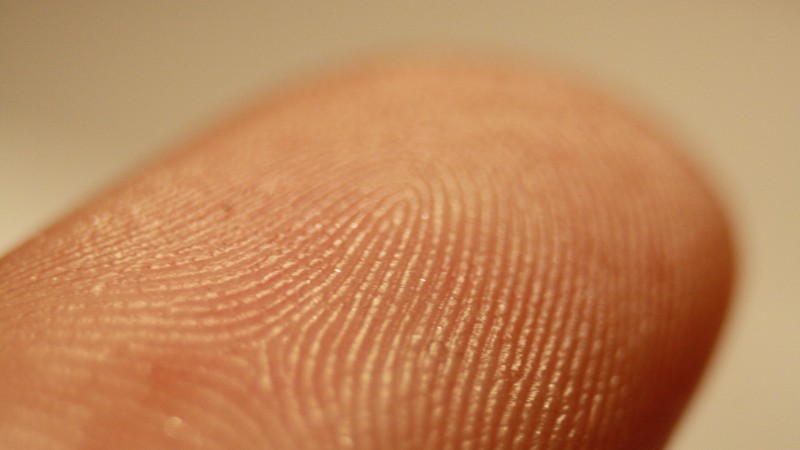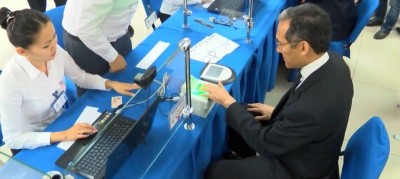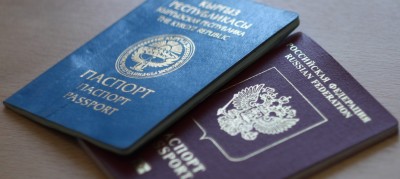
Fingerprinting for biometric data. Wikipedia image.
Kyrgyzstan is falling into line with international standards by requiring citizens to submit biometric data for new passports. But some citizens, wary of creeping authoritarianism in the country and a lack of transparency in local law enforcement, are resisting the call.
The procedure officially began on August 28, 2014, when Prime Minister of the Kyrgyz Republic, Jomart Otorbaev, and Mayor of the Kyrgyz capital, Bishkek, Kubanychbek Kulmatov, submitted their biometric data.
Since then, there have been numerous controversies connected to the call, mostly focussed on the failure of the notoriously corrupt State Registry Service (SRS) to ensure biometric data points are properly equipped.
Currently the SRS admits it “cannot force” citizens to submit their data, but an SMS message distributed by local mobile service providers this month refers to the “obligatory” submission of data for people aged 16 and over.
The official website of the President of the Kyrgyz Republic says the formation of the biometric data database will offer the basis for accurate voter identification procedures ahead of parliamentary elections in 2015, reducing the carousel voting that has become common in local elections over the years.
Many citizens claim that the new policy limits personal freedoms and the right to privacy. As one reader of the popular news platform vb. kg argued:
биометрический паспорт противоречит принципам демократии. не обманывайте народ кыргызстана. это приводит тоталитарному контролью.
Biometric passports contradict the main principles of the democracy. Don’t lie to the people of Kyrgyzstan. This policy will lead to totalitarian control.
On the website's Facebook page, users discussed what motivations were behind the sudden demand for biometric data. Sarcastic suggestions were quick in coming:
накосячишь и тебя утром группа захвата будит
You do something wrong and a hit squad group wakes you up the next morning.
Perplexed state officials have already complained that many citizens are refusing to comply with the request, based on the belief that the data will some day be used against them. MP Cholpon Sultanbekova, the widow of a murdered mob boss, says citizens feel their data may be used by other people to secure loans under false premises, or in other criminal schemes.
Commenting under an article published on Kloop.kg, Dinara Oshurakhunova, head of the Coalition for Democracy and Civil Society writes:
биометрика нужна бесспорно. но при том, что наши правоохранительные структуры не реформированы и почти полностью криминализованы, я бы не хотела, чтобы они имели доступ к биометрическим данным граждан.
Biometric submissions are necessary for sure. However, due to the fact that our law enforcement agencies are unreformed and almost completely criminalized, I would not like them to have access to the biometric data of citizens.
Head of the SRA, Alina Shaikova, has assured the population that all data is encrypted into codes and that officers collecting the data have received the training required to keep the data safe. Shaikova's agency has also said there will be no punishment for citizens that do not submit their data.

Otorbaev submitting his personal data. A picture taken from Kloop.kg.
Writing in his blog, journalist Azat Ruziev notes:
Основной критикой закона было то, что он противоречит Конституции Кыргызстана, в частности, праву на самоопределение в отношении своих личных данных и праву на неприкосновенность и охрану частной жизни человека.
The main criticism of law is that it contradicts the Constitution of the Kyrgyz Republic, in particular, the right to self-determination in relation to personal data and the right to privacy.

Passports. A picture taken from Kloop.kg
Kyrgyzstan will be the last Central Asian country to introduce a biometric system for passports as a number of countries warn that citizens travelling without biometric passports will not be allowed into their territories.
Turkmenistan was the first country in the region to provide the biometric passports in 2008, before Kazakhstan followed the example of its neighbour in 2009. Biometric data was subsequently introduced in Tajikistan in 2010 and in Uzbekistan in 2011.
Three months into the biometric data submission period, there have already been a number of scandals. In October, vb.kg reported that during the frenetic process of collecting data, top officials from the State Registration Service travelled to Montreal, Canada to attend a conference on counterfeit ID. Their trip was allegedly paid for by the British company De La Rue, a former contractor of the government and a likely bidder on the lucrative tender to produce the new biometric passports next year.
Correspondents of the same newspaper also found it was impossible to submit biometric data at several of the government-appointed facilities in the capital, due to lack of equipment, staff, or an unannounced change of location.
Nevertheless, some say that the nationwide collection of biometric data is long overdue and that the problem is the government's typically clumsy execution of the plan:
Работа начата и хорошо, что наконец-то правительство пошло на этот шаг. Хотя надо было начать раньше, чтобы без ажиотажа.
Work has started and that is a good thing. Finally the government has begun working on this issue. They should have started earlier in order not to do everything at the last minute, though.







1 comment